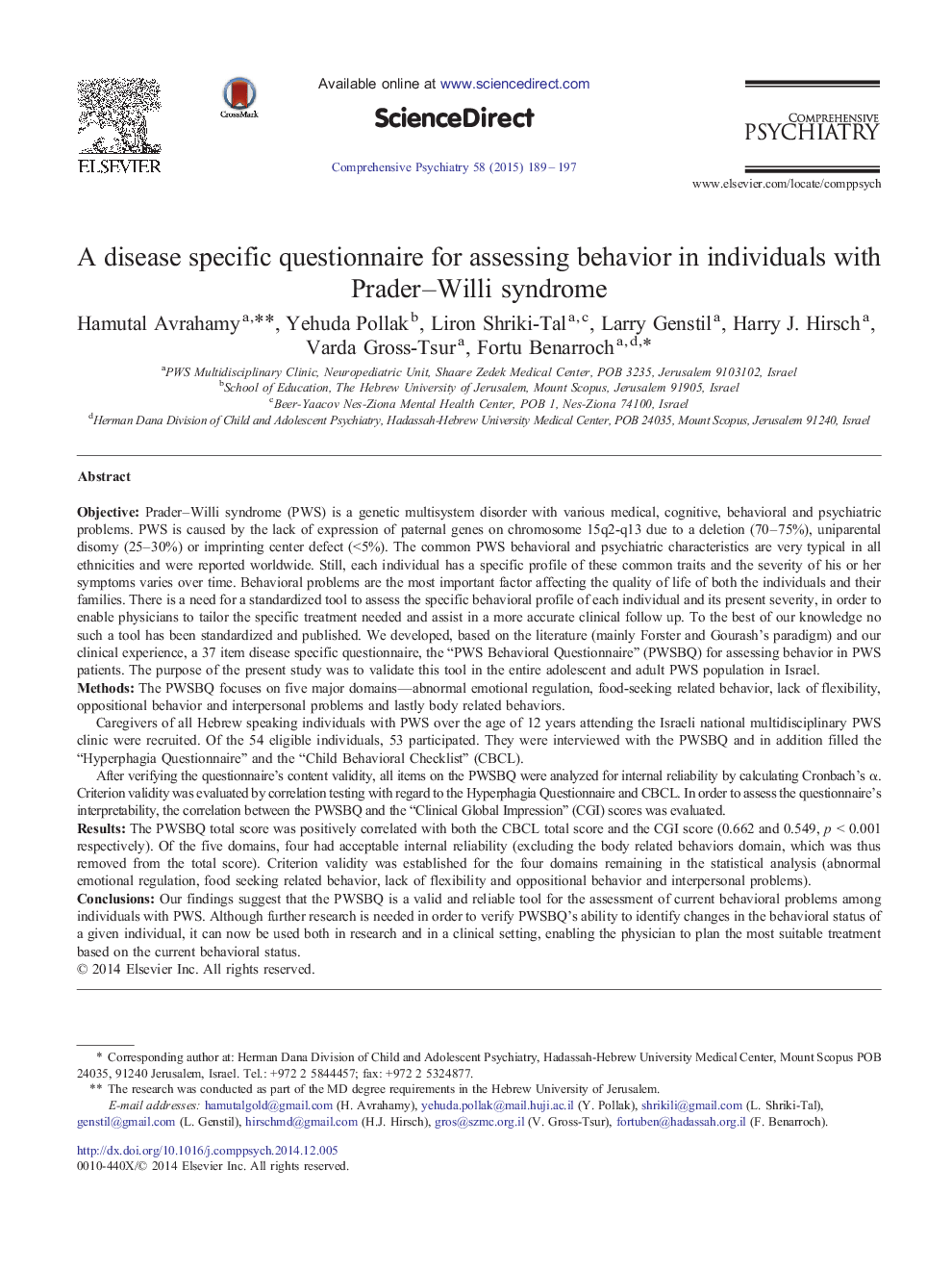| کد مقاله | کد نشریه | سال انتشار | مقاله انگلیسی | نسخه تمام متن |
|---|---|---|---|---|
| 317401 | 538163 | 2015 | 9 صفحه PDF | دانلود رایگان |

ObjectivePrader–Willi syndrome (PWS) is a genetic multisystem disorder with various medical, cognitive, behavioral and psychiatric problems. PWS is caused by the lack of expression of paternal genes on chromosome 15q2-q13 due to a deletion (70–75%), uniparental disomy (25–30%) or imprinting center defect (<5%). The common PWS behavioral and psychiatric characteristics are very typical in all ethnicities and were reported worldwide. Still, each individual has a specific profile of these common traits and the severity of his or her symptoms varies over time. Behavioral problems are the most important factor affecting the quality of life of both the individuals and their families. There is a need for a standardized tool to assess the specific behavioral profile of each individual and its present severity, in order to enable physicians to tailor the specific treatment needed and assist in a more accurate clinical follow up. To the best of our knowledge no such a tool has been standardized and published. We developed, based on the literature (mainly Forster and Gourash's paradigm) and our clinical experience, a 37 item disease specific questionnaire, the “PWS Behavioral Questionnaire” (PWSBQ) for assessing behavior in PWS patients. The purpose of the present study was to validate this tool in the entire adolescent and adult PWS population in Israel.MethodsThe PWSBQ focuses on five major domains—abnormal emotional regulation, food-seeking related behavior, lack of flexibility, oppositional behavior and interpersonal problems and lastly body related behaviors.Caregivers of all Hebrew speaking individuals with PWS over the age of 12 years attending the Israeli national multidisciplinary PWS clinic were recruited. Of the 54 eligible individuals, 53 participated. They were interviewed with the PWSBQ and in addition filled the “Hyperphagia Questionnaire” and the “Child Behavioral Checklist” (CBCL).After verifying the questionnaire's content validity, all items on the PWSBQ were analyzed for internal reliability by calculating Cronbach's α. Criterion validity was evaluated by correlation testing with regard to the Hyperphagia Questionnaire and CBCL. In order to assess the questionnaire's interpretability, the correlation between the PWSBQ and the “Clinical Global Impression” (CGI) scores was evaluated.ResultsThe PWSBQ total score was positively correlated with both the CBCL total score and the CGI score (0.662 and 0.549, p < 0.001 respectively). Of the five domains, four had acceptable internal reliability (excluding the body related behaviors domain, which was thus removed from the total score). Criterion validity was established for the four domains remaining in the statistical analysis (abnormal emotional regulation, food seeking related behavior, lack of flexibility and oppositional behavior and interpersonal problems).ConclusionsOur findings suggest that the PWSBQ is a valid and reliable tool for the assessment of current behavioral problems among individuals with PWS. Although further research is needed in order to verify PWSBQ's ability to identify changes in the behavioral status of a given individual, it can now be used both in research and in a clinical setting, enabling the physician to plan the most suitable treatment based on the current behavioral status.
Journal: Comprehensive Psychiatry - Volume 58, April 2015, Pages 189–197